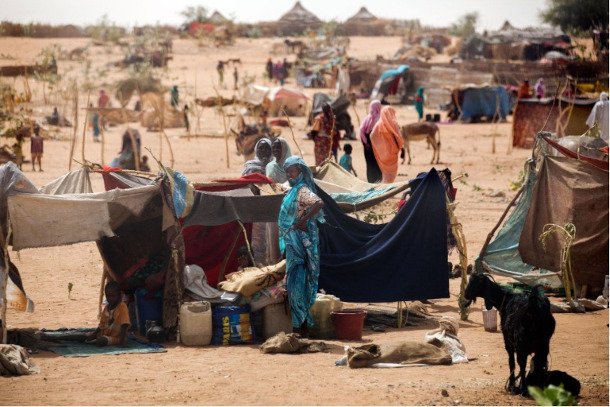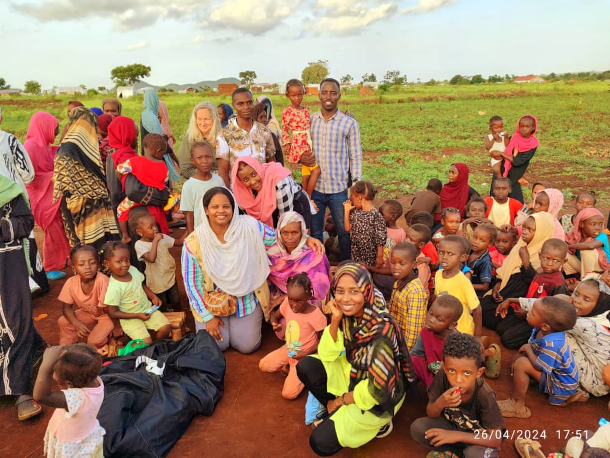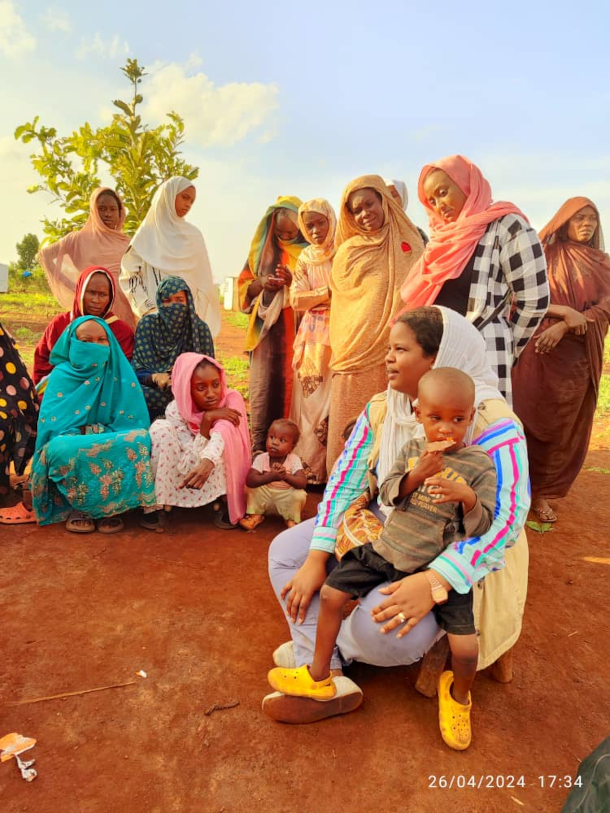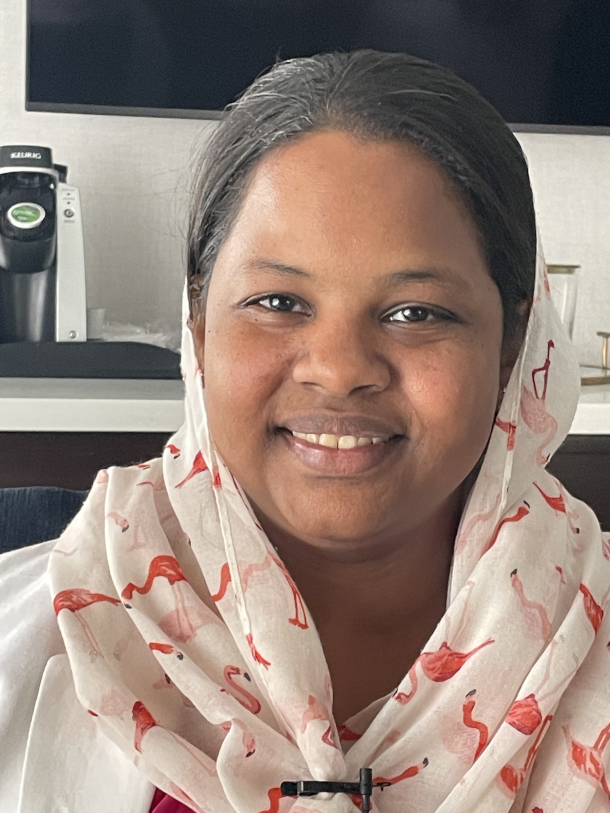Sudan's Climate and War Misery
Air Date: Week of October 4, 2024

In the aftermath of the collapse of the 30-year Bashir dictatorship in 2019, Sudan has been devastated by the impacts of climate change and the ravages of war as two rival generals struggle for power. Millions of Sudanese have fled their homes. Pictured above are displaced communities in Zam Zam camp for Internally Displaced People (IDP) in North Darfur. (Photo: Albert Gonzalez Farran, UNAMID, Flickr, CC BY-NC-ND 2.0)
Millions of Sudanese people have fled armed conflict in recent months, only to face famine as well as floods and extreme heat worsened by climate change. Nisreen Elsaim is a young climate activist from Sudan who co-chaired the UN Secretary General’s first youth advisory group on climate change. She joins Host Steve Curwood to describe the harrowing conditions for Sudanese refugees and what gives her hope.
Transcript
DOERING: It’s Living on Earth, I’m Jenni Doering.
CURWOOD: And I’m Steve Curwood.
Sudan in Northeastern Africa is one of the world’s most climate-vulnerable nations, often grappling with deadly rainfall and flooding, as well as devastating droughts. It has also been torn by war, off and on, for decades. Since 2023 when two rival generals launched the most recent armed struggle for power, according to the UN Refugee agency more than 7 million Sudanese out of a population of 50 million have fled their homes. These internally displaced persons or IDPs, inhabit camps where many bake in heat waves of 128-degrees Fahrenheit and fall prey to disease, violence, and starvation. And another 2 million or so Sudanese have fled over the borders to Ethiopia, Chad and South Sudan, where conditions can be just as bad. Trained as a physicist, Nisreen Elsaim is a young climate activist and was co-chair of the UN Secretary General’s first youth advisory group on climate change. In the summer 2023 as fighting escalated, she was forced to flee Sudan along with her then nine-month-old son. She is presently based in Berlin, Germany. During the opening of the general assembly of the United Nations and Climate Week in New York City last month, Nisreen spoke with me about her call for humanitarian aid for Sudan and the region. Please be aware our discussion contains events and conditions you may find alarming, including mention of sexual violence.
CURWOOD: Nisreen, tell me what are some of the ways the climate crisis has worsened the situation for everyday Sudanese?
ELSAIM: In General, or after the war?
CURWOOD: Take your pick.
ELSAIM: Okay, so let's start from what's very recent, and then go back. So, Sudan is a big country, as you may know, and we have 18 states; 14 states are experiencing ongoing clashes, and people had to flee to either neighboring countries or other states within Sudan. So out of 18 states, only four states doesn't have ongoing clashes and like air shelling and gun firing and stuff like this. So, a lot of Sudanese took them as shelter. Unfortunately, they were the states that are heavily impacted by the worst floods we had in a century. And basically, these four states are as big as Germany in size, and they are all under the water, as we speak. And it's very, very devastating, because 27 villages disappeared, like melted, like salt or sugar in water melts, because the area is a very dry, very desert area, actually. So, most of the house materials they build the houses with is mud and sand. So, when the water come, it was just like putting a cotton candy in a water. This is exactly how we are, really, so, and this, of course, results 1 million more to add to the crisis of 12 million IDPs and refugees already because of the war and ongoing clashes. But I think the most devastating is that a lot of the IDP camps were actually flooded, so people had to flee for the second time, sometimes for the third time, losing everything all over again. Moving to a new place all over again, and this made a lot of people extremely vulnerable and extremely traumatized, I think the last but not least, the burden that comes with floods, waterborne diseases. And of course, the health system is collapsing because of the war. Already, 80% of the hospitals in Sudan are out of the service because of the shelling and because of the fighting, so now the government declared cholera. Unfortunately, we have more than 500 cases who passed away due to cholera. And in Kassala, which is in the eastern region of Sudan, one of the isolation camps for people who have cholera, was actually flooded.
“Who told you we have the privilege of losing hope?
— UN OCHA Sudan (@UNOCHA_Sudan) October 1, 2024
The numbers you read is not just numbers, they are actual people … they are actually me” @NisreenElsaim the peace and climate activist urges the global community to #KeepEyesOnSudan pic.twitter.com/Ed08FyWHnZ
CURWOOD: So just since 2021 and then the long history that you alluded to, how has the situation related to the climate emergency worsened over the last decade or so?
ELSAIM: So basically, we used to have floods every 20 to 15 years, minimum, and people used to be named after the floods because it was really rare. So, they say X was born in the year of flood. Now, I think we experienced the very bad floods in 2013 another very bad floods in 2018 and another catastrophic floods in 2020 and now in 2024, so it's more current. And instead of having a lifespan of 20 or 25 years between floods, now we have it every three or four years maximum. This is one side. the second side. Of course, the issue of climate change, peace and security and how can climate change trigger conflicts in Sudan is not new. I mean, the first time there was a systematic integration of the two issues was with the war in Darfur, when the previous Secretary General, Ban Ki-Moon said that the war in Darfur is actually the first war in the new history that is climate driven. And then, of course, we know that the war in Darfur did never actually finish, and they are the root cause of a lot of what's happening right now in Sudan. So yeah, and if you really dig deep to the root causes of that war, it's basically conflict between farmers and pastors over Russia sources, because nothing is enough for the people anymore. And Sudan, of course, is not the only country. Most of the Sahel and Lake Chad and the Congo Baisin. A lot of communities in these places are witnessing are very rapid losses of resources, and it's making their lives really, really harder. Of course, now in Sudan, having a temperature of 52 to 53 Celsius in the summer is very normal, to the point that people even don't stop, they just continue their life normally.
CURWOOD: How do you deal with a temperature like that?
ELSAIM: I think we have a dragon grandfather, really. Because for me, even when I see people in the street walking and using public transportation, cooking and drinking tea in the side of the street. I was like, I don't know. I really think maybe we have a dragon grandfather.

Children have not been spared the harsh realities of war and the impacts of climate change. Nisreen Elsaim visited with young refugees during her visit to the region earlier in 2024. (Photo: courtesy of Nisreen Elsaim)
CURWOOD: Global leaders came to New York to talk about climate change. What does the outside world need to know about the humanitarian and climate crisis that the Sudanese people are facing right now?
ELSAIM: Well, to be honest with you, I think there is a fatigue, international fatigue, in terms of doing something about the current problems. I think people are overwhelmed, and not only people. I'm talking about governments; I'm talking about private sector. I mean, the whole international community is overwhelmed with what's happening on Ukraine and what happened before in Libya and Yemen and Syria. And there is a lot of conflict coming over and over, very quickly after each other. And I mean, we are witnessing the worst era since the World War Two, when it comes to how many conflicts we have around the world, and of course, the catastrophic genocides in Gaza and so on. But then, does humanity have priorities? Or all humans are equal? I mean, this is the question that we need to keep asking ourselves.
CURWOOD: So, you mentioned the catastrophic genocide in Gaza and a certain extent now the West Bank, even, about 40,000 people have estimated to have died there. What's been the death toll in Sudan?
ELSAIM: 52.
CURWOOD: So, more people dying in Sudan?
ELSAIM: Definitely. We have bigger population. We have bigger land. I think the only thing that makes the situation in Sudan 1% maybe better than the situation in Gaza is we had borders to escape to, while people in Gaza did not have it. But in terms of the number of IDPs and refugees, 12 million until now, which is the biggest internationally, stage five famine, the number of victims is bigger. The intensity of violence is also somehow bigger. And also, there is something that is very against the human rights and a huge violation of humanity, is that in Sudan, there is a tradition of systematic rapes. So, they actually use rape as a weapon in the wars, not like only bullets and killing. And this leaves, like a whole generation of young females totally devastated, not only them, but their families, and they don't have a future. And, yeah, I think, I think, as a woman, I prefer to be killed than to be raped.
CURWOOD: When was the last time you were in Sudan?
ELSAIM: I did another trip back to Sudan in January this year, January 2024 I went to port Sudan because Khartoum is definitely no go and there's no airport there anymore. So, I went back to Port Sudan. I used the ship. It took me 34 hours to reach from Jeddah to Port Sudan, and then from Port Sudan to Jeddah back to Saudi Arabia, and I visited a lot of camps, of the IDPs camps there, and the situation was just more than anyone can take. And there is no actual camps. So, they are located inside of schools. They put one school for women and girls and one school for boys and men. And of course, there's a lot of violations happening there, but also a lot of unrest, because it's a school; it's not, it's not even a camp. Even a camp would be better than, than that situation. I also visited some camps of refugees outside Sudan. So, I visited the camp in Uganda, and I visited the camp in Chad and Ethiopia, and it's even worse than you can imagine. They are in a new country that speak a different language, a different nature, and thousands of people have only one toilet, and it's very far to the point that if you're going to the toilet, the whole camp will know that you're going to the toilet. So, a lot of girls didn't go to the toilet because they just didn't want everyone to know them. There is a culture in that, and a lot of urine infections and a lot of kidney diseases start to show because they are just simply holding their pee without going to the toilet. But if you risk you going to the toilet at night when no one is looking, then you get raped, because there's no lights in the way to the toilet, and there's no security, so anyone can do anything without really someone even knew who that person was. So, there was a lot of rape cases in the in the camps, in a lot of places.
CURWOOD: Somebody listening to this now is horrified and at the same time wondering, how does this link back to the climate emergency that we're in now, how does that aggravate add to make these horrible things more possible? Because the climate is being disrupted.
ELSAIM: Definitely. One of the biggest solutions to climate change is renewable energy, and it's also one of the biggest solutions for the suffering of a lot of people. A lot of people have malnutrition, not because they don't have something to eat, but basically because they don't have something to cook with. So, we're trying to introduce solar cookers for these people. Lighting, which is a huge problem, as I told you, there's no lights through the road to the toilet. Solar of young girls get raped, and solar torches and solar lights is very much doable. The idea with solar energy, and why it works very much in such contexts, is that is, it's so decentralized, so it doesn't have to have a government or a grid or anything anywhere can use it. And there's a lot of sun, I told you, we reach 54 degrees sometimes celsius in summer, so there is a lot of solar radiation. So, I think the suffering of Sudanese people currently is from both from climate change, but from the conflict. But the answers that fix the climate change problem could actually also fix the conflict and the war problems, not all of them, but at least make the life of these people at least 1% better.

During her conversation with LOE’s Steve Curwood, Elsaim spoke about visiting IDP and refugee camps to learn of the plight of those forced from their homes. The war has taken a considerable toll on women, who face the constant threat of violence. Listeners should be aware their discussion contains events and conditions they may find alarming, including mention of sexual violence. Photo: Nisreen Elsaim visits with female Sudanese refugees in camps. (Photo: courtesy of Nisreen Elsaim)
CURWOOD: Your focus is on youth as key actors for climate adaptation. Talk to me about the role that the youth of Sudan and elsewhere in Africa and around the world can play to help alleviate the impacts of climate disruption.
ELSAIM: I think the first and the biggest role that young people are trying to do right now is the, to raise the awareness of the problem itself, to make their communities aware that something like this is happening, and maybe help them to adapt, because climate change is a problem. But if you don't know that the problem exists, then how can you even think of a solution for it? Right? So, I think this is the first, maybe obvious role of young people, but the one that I think a lot of people don't talk about or neglect is that the young people are the first respondents when a climate crisis happen. They are the ones who rebuild their communities. They are the ones who are easily communicating and easily organizing and easily reaching others to really help them. And in Sudan, is not different, is it? We have something called the emergency response rooms, and it is a very local youth led processes to aid the communities and the neighborhoods, even without support, without financial support, without UN support, without Red Cross, without any support. And it was the same in the times of the floods all over the different floods I attended, like 2013, 2018, 2020, yeah, they had something called nafir and it was a basic… Nafir in the Sudanese context means collective action. This is the local word of collective action, nafir. And Nafir was a very famous program where volunteers from all over Sudan did amazing work. People sometimes volunteer their cars if they don't have time, like 4 by 4 cars where they can go into the mud and the water just to deliver things. Some people were volunteering, even their Tuk Tuks, and they were used as ambulances because we needed something small and can also fit the small streets to take the people who are injured. Some people were denoting money. Some people were on the ground themselves. And it is not different. A lot of African countries having the same the people in the Sahel region, especially in Burkina Faso and Chad and in Mali, are doing the same with their communities, planting trees to reduce the impacts of the desertification, trying to communicate about plastic pollution in Ghana and in Senegal and all of the coastal cities and coastal countries, planting even more trees in Kenya, fighting biodiversity losses in Tanzania, I can go more and more. The energy, the aspiration, the drive for change that young people have, not only for climate change, but for all of sorts of issues, is always marvelous.
CURWOOD: Indeed. Nisreen, you're passionate about your demands for global action on climate disruption. So, what do you see as the signs of hope or optimism in your campaign?

Nisreen Elsaim in New York City during Climate Week. Trained as a physicist, Elsaim is a young climate activist and was co-chair of the UN Secretary General’s first youth advisory group on climate change. In summer 2023 as fighting escalated, she was forced to flee Sudan along with her then nine-month-old son. She is now presently based in Berlin, Germany. Elsaim spoke at the recent United Nations meeting on Sudan: Inaction is Not an Option. (Credit: Living on Earth)
ELSAIM: Well, if I have to be honest, I don't see any signs for hope, but I am also in a position where I don't have the privilege of losing hope. So, for me, hope is not about the science that others shows for change, but about my inner drive and about the issue being still there. And I'm not a pessimistic, but when I say there is no science, I'm talking about the current situation and the very obvious behaviors by world leaders, for example. We are heading into 3.4 Celsius in terms of global warming. But remember, the Paris Agreement goal was 1.5 degrees, 2 degrees Celsius in the worst-case scenario. And even with 1.5 Africa will lose at least 30 of its resources, natural resources, and with the two degrees, we lose more than 80% of our resources. So now we're going to 3.4 and this is something not even like imaginable, at least from my side of view. They are talking now about loss and damage, but losses and damages are all too late, right? They are talking about adaptation to climate change. It is very important, but you can only adapt until a certain point. What if the world is not adaptable anymore? What if we reach the break point where the environmental system doesn't work for us as humans anymore? Mitigation and a serious phase out of fossil fuel is a must. All of the work around that, without a serious cut in the emissions, is going to go with the wind, if not today, next day, the year, if not next year, the year after, if not this decade, the decade after. And I think we are all have to face this reality.
CURWOOD: What gets you out of bed in the morning? How can you get out of bed, knowing how things are as difficult as, as we've talked about today, people literally dying in your homeland for lack of food, water, it's too hot, there's disease, there's war raging. How do you get up in the morning and stay at it again?
ELSAIM: I can still do something about it, even if it's small, even if it's saving the life of one people, even if it's helping one student to get a scholarship. I can still do something about it, and as long as I can do something about it, I cannot stop. Everyone can do something about it. They just need to know that they can do something about it and take that action.
CURWOOD: Nisreen Elsaim is currently a fellow at the Robert Bosch Academy, working on climate change, peace and security for her homeland in Sudan. Thank you so much for taking the time with us today.
ELSAIM: Thank you. It was a pleasure.
Links
Learn more about the humanitarian crisis in Sudan
The Guardian | “How water is helping to end 'the first climate change war”
Sada Middle East Analyst | “Climate Change and Conflict: A Perfect Storm in Sudan's Countryside”
Learn more about Nisreen Elsaim
BBC | “'Rape me, not my daughter' - women tell BBC of sexual violence in Sudan's civil war”
Human Rights Watch | “Sudan: Widespread Sexual Violence in the Capital”
Living on Earth wants to hear from you!
Living on Earth
62 Calef Highway, Suite 212
Lee, NH 03861
Telephone: 617-287-4121
E-mail: comments@loe.org
Newsletter [Click here]
Donate to Living on Earth!
Living on Earth is an independent media program and relies entirely on contributions from listeners and institutions supporting public service. Please donate now to preserve an independent environmental voice.
NewsletterLiving on Earth offers a weekly delivery of the show's rundown to your mailbox. Sign up for our newsletter today!
 Sailors For The Sea: Be the change you want to sea.
Sailors For The Sea: Be the change you want to sea.
 The Grantham Foundation for the Protection of the Environment: Committed to protecting and improving the health of the global environment.
The Grantham Foundation for the Protection of the Environment: Committed to protecting and improving the health of the global environment.
 Contribute to Living on Earth and receive, as our gift to you, an archival print of one of Mark Seth Lender's extraordinary wildlife photographs. Follow the link to see Mark's current collection of photographs.
Contribute to Living on Earth and receive, as our gift to you, an archival print of one of Mark Seth Lender's extraordinary wildlife photographs. Follow the link to see Mark's current collection of photographs.
 Buy a signed copy of Mark Seth Lender's book Smeagull the Seagull & support Living on Earth
Buy a signed copy of Mark Seth Lender's book Smeagull the Seagull & support Living on Earth

